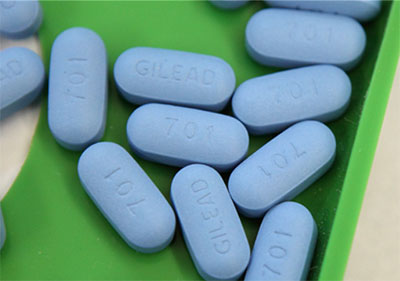DESIRE FOR INTIMACY MAY LEAD GAY MEN TO USE PrEP
 A new study has found that intimacy is a powerful factor in the choices some gay and bisexual men make when it comes to HIV prevention.
A new study has found that intimacy is a powerful factor in the choices some gay and bisexual men make when it comes to HIV prevention.
Researchers concluded that a desire for intimacy among these men, who are in steady relationships where both partners are HIV negative, is a major reason for them not using condoms, even if they also have sex outside the relationship.
The study found that the same desire for intimacy is also a strong reason for these men to instead consider taking antiretroviral medication to prevent HIV, an emerging practice known as pre-exposure prophylaxis or PrEP.
The medication, if taken daily as prescribed, has been shown to dramatically reduce the risk of HIV infection (by up to 92%).
This year, the US Public Health Service and the World Health Organisation (WHO) recommended that people at high risk of getting HIV use PrEP, including gay or bisexual men who have condomless anal sex.
But as the recommendation becomes clinical practice, many people are wondering whether men will make PrEP part of their daily lives and what will keep them motivated to adhere to it strictly, which is required if the medication is to have its protective effect.
The new study, published in the Annals of Behavioral Medicine, suggests that PrEP’s appeal to many men who have sex with men (MSM) in romantic relationships with HIV-negative partners is the belief that it can allow them to remain intimate with their partners while still having some protection from HIV.
“In this sample of men who are in a relationship with a perceived HIV-negative man, we found that intimacy motivation was the strongest predictor [of adopting PrEP],” said Kristi Gamarel, a psychiatry and human behaviour post-doctoral researcher in the Warren Alpert Medical School of Brown University.
“Sex doesn’t happen in a vacuum — interpersonal and relationship context really matter. Many HIV infections are occurring between people who are in a primary relationship.”
The study is based on extensive interviews with 164 HIV-negative MSMs who were in steady same-sex relationships and who had condomless anal sex at least once in the prior 30 days. The researchers found that those who rated intimacy highly as a reason why they sometimes engage in condomless sex also were 55 percent more likely to say they would adopt PrEP if it were available for free.
“For people who are disseminating PrEP or talking to patients about PrEP, I think it’s important to think about their relationships,” Gamarel said. “Something that’s being supported and endorsed right now by the WHO is couples voluntary testing and counselling. That may be a way to disseminate PrEP and to allow couples to have a discussion about whether PrEP is good for their relationship and how they can support each other using PrEP.”
Gamarel cautioned that the study results cannot be taken as evidence that PrEP will reduce condom use. The men in this study were already not using condoms at times without being on PrEP, she noted. The study simply sought to ascertain whether these men would adopt PrEP and to determine why.
Condoms remain important to gay men’s sexual health, she added, both because they reduce the risk of HIV transmission and because they can block other sexually transmitted infections that PrEP does not.
I must say if you cannot have condom less sex with your long-term partner, well, it creates a bigger concern for the major trust issues in the modern era among gay men? But yes, one needs to protect yourself (cause who do you trust these days – many sluts abound) but why always just promote protection and prevention? Why not also try to promote people to be a little more monogamous or trustworthy in their relationships? It’s psychological factors than can be generated from childhood. It is pretty much the same that the government is doing by promoting condoms in schools, but nothing more. Kids grow up with nothing on their minds but sex (cause it is now safe nothing can happen mos!), and sexual crimes among the youth are soaring. The statistics are bleak compared to 10 years back, and due to “coming out issues” I think sexual crimes among the gay youth go pretty much undocumented. I’m not trying to say “viva la morals and values” (that’s up to everyone’s own ideas), I’m merely saying that as sex is so complex, we should touch on ALL CORNERS of having safe sex, the psychological make up as well, not just the physical. There is protection and also “protection”.